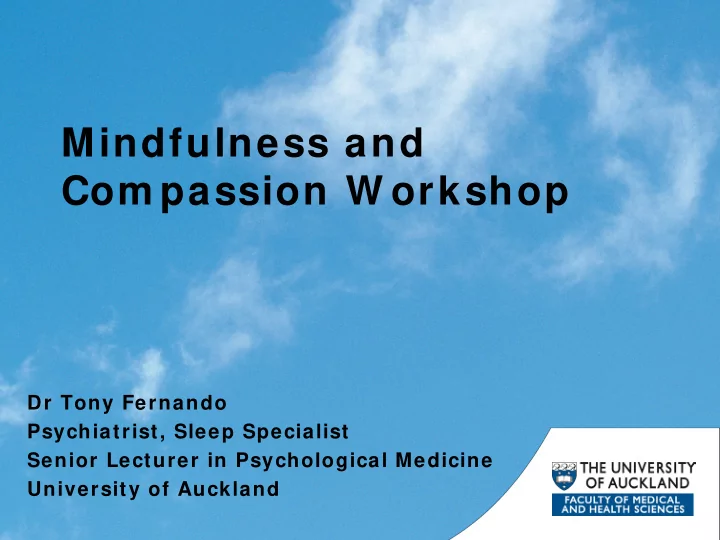

Mindfulness and Com passion W orkshop Dr Tony Fernando Psychiatrist, Sleep Specialist Senior Lecturer in Psychological Medicine University of Auckland
Ajahn Brahm Ajahn Amaro
Circuitries for happiness Calm Excitement Connection Contentment Drive Compassion
Exercise For 1 minute, close your eyes, notice what your mind does What did you notice? What did you think about? Emotions? Judgments? This is 1 minute, in a contained environment, with not much stressors going on
Out of control m inds and em otions
2 arrow m etaphor of suffering • 1 st arrow- source of suffering • 2 nd arrow- relationship with the 1 st arrow • Self-induced suffering because of our own thinking patterns
“crazy m ind” • Chattering • Planning • Remembering • Fantasising • Calculating • Papanca
• Self Critic • Know who’s Com m ittee chairing, • Checklist m em bers speaking the • Control Freak loudest of the • Angry m ind • Irritable • Acknowledge • Judgmental and accept that • Greedy it’s part of you, • Kind neither good or bad • Submissive • Pleaser • Lustful • Caring • Compassionate
• We are all NUTS • Evolved to protect us, propagate the species
Exercise for 5 m inutes • Relaxed but alert posture • Close your eyes • SMILE • INTENTION- may I put in a good effort in my mindfulness practice, to benefit not just myself, but other beings as well • Notice the breath- coming in and coming out • Notice kindly; not too intense • Let the breath do its thing; don’t control it • You will have distractions; from your surroundings; from your own mind and body; just notice, accept calmly, gently go back to the breath
How w as that? • Positive experiences? • Difficulties? • Expectations?
• Not about focusing on the breath but how we relate to the breath • “distractions” are not distractions; they are stimuli that your mind judges as distractions; • instead, view them as mindfulness aids; relate to them kindly as they are your reality!
Expectation • One of the biggest sources of suffering • Suffering or Stress = Expectation/ Reality • S= E/ R • Mindfulness teaches us to accept reality as it is; aligns expectation with reality less suffering
Exercise for 5 m inutes • Relaxed but alert posture • Close your eyes • SMILE • INTENTION- may I put in a good effort in my mindfulness practice, to benefit not just myself, but other beings as well • Notice the breath- coming in and coming out • Notice kindly; not too intensely • Let the breath do its thing; don’t control it • Be kind to your experiences- both external and internal (thoughts, feelings, sensations) then gently go back to the breath
How w as that?
W hat do you do w hen you notice that you are: • Distracted • Lost in thought • Judgmental • Falling asleep • Scattered
Mindfulness allow s us to see our suffering and crazy m inds
Diagnosis? We are all “crazy” Mindfulness as a m icroscope
W hat Mindfulness is not Quieting the mind Plain concentration Focusing on the breath Changing your situation e.g. pain, anger, anxiety
I nform al m indfulness training • Walking meditation – Instead of paying attention to the breath, meditation object is the sensation of walking – Transition to mindfulness in everyday life • Eating meditation • Shower meditation, bathtub meditation, driving meditation, dishwasher meditation, meditation with the patient…
Key Skill • Accepting reality (thoughts, feelings, experiences) as it is… now – Different from resignation • Being at peace with what “is”… now • Kind to oneself
• We are practicing mindfulness not just to achieve a certain experience (problematic) • BUT to learn how w e relate to experience • Distractions are not the problem, but it’s how w e relate to distractions (our crazy mind)
Com passion Training
Com passion not “sw itch” Com passion is conditional family/ likeability/ similarity deserving vs blameworthy external environment, bystander effect stress/ pressure/ SAFETY
• Burnout/ Fatigue • Difficult Patient/ Family • External Distraction • Clinical Complexity Barriers to Com passion in Medicine (Fernando, Consedine PGMJ 2014)
• Address burnout and fatigue • Motivation: May I be of benefit 2BOB “Be of Benefit” • Perspective: See everyone as exactly like you- we all have dramas and baggages; we all want to be happy Enhancing • TOUCH com passion • Compassion meditation training • Mindfulness training – James Donald Meta Analysis on mindfulness and prosocial behavior – Fernando, Skinner, Consedine – Condon, Desbordes, Miller, Desteno
Meditation Training on Com passion • Metta bhavana • May you be safe, free from suffering, be happy and be at peace • http: / / ggia.berkeley.edu/ practi ce/ compassion_meditation • http: / / www.calm.auckland.ac.n z/ 20.html
Com passion not just for others but also for ourselves Why are we practicing mindfulness? Who suffers a lot? We do, mainly from our crazy minds
I have been practicing compassion through mindfulness and I have found it incredibly liberating. I am able to overcome habitual patterns of self-critisicing and negativity and treat them and myself with kindness and observe as they evanesce. By being compassionate with myself, I can be compassionate to friends and whanau.
Contact me for copy of the talk a.fernando@auckland.ac.nz
Recommend
More recommend